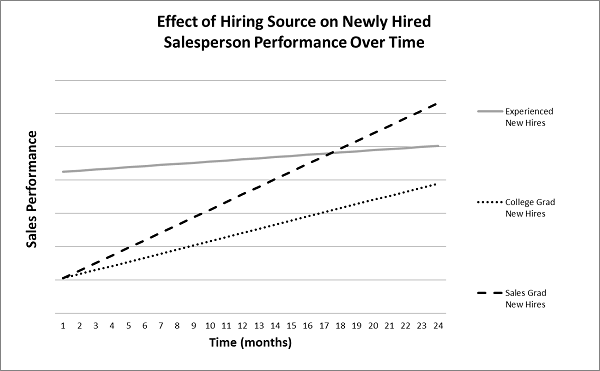ATD Blog
Hiring Sales People? Look for Experienced Sales Veterans or Inexperienced College Graduates?
Wed Apr 01 2015

With the economy showing signs of recovery, many companies are in the market to hire sales people. This struggle to recruit top sales talent has brought about the resurgence of a very old debate in the world of sales management: should we hire sales people with previous experience or brand-new, inexperienced sales people?
On one hand, some believe that those with prior sales experience understand the sales job better, aren’t scared away by the more daunting aspects of a sales career, and likely need less training or support. On the other, some have noted that experienced sales people can bring an unpredictable portfolio of bad habits along with them. This group of managers would rather hire inexperienced sales people whom they feel represent a “clean slate.”
How many times have you heard sales leaders say things like: “We only hire experienced sales people who are ready to hit the ground running?” Or, perhaps taking the opposite stance: “Hiring experienced sales people only gets us other companies’ bottom performers?”
We’ve done some research on this issue and found that both sides of the argument hold some truth.
Option #1: Experienced Veterans
In a recent study of the longitudinal performance patterns of newly hired sales people, those with significant prior experience exhibited strong initial sales performance but very little performance growth following this strong start. In other words, they are able to “hit the ground running,” but seem held back from long-term performance improvement (perhaps by bad habits and complacency).
Option #2: Inexperienced Graduates
In contrast, new sales people hired directly out of college start with relatively lower initial performance numbers, but they exhibit consistent performance growth over time. In fact, while out of the range of our current data, it appears that those inexperienced college hires will reach the same level of performance as the experienced sales people after approximately two and a half years. In other words, they lack the ability to perform immediately, but seem to possess the motivation and capability for ongoing performance growth.
Option #3: Graduates with Experience
Of course, this discussion ignores a third source of new hire sales people: college graduates who participated in collegiate sales programs. It’s true, collegiate sales education is a real—and growing—option. Across the country at universities like Florida State, Baylor, Texas State, and Kennesaw State, college students are learning about selling and engaging in sales call simulations, role play competitions, and other types of intense, supervised, and coached practice—all before acquiring any in-field experience.
In his bestselling book Outliers, Malcolm Gladwell describes this type of practice as a key ingredient in the development of world class performance in just about any field. The idea is simple: We don’t expect musicians or athletes to develop proficiency simply through hard experience (live performance and actual games); we provide them a framework for navigating their art or sport, and then allow them to practice extensively while actively providing coaching along the way. The idea that someone could learn to play a violin by sitting on a stage and “experiencing” it seems preposterous. Yet, this is often our perspective on how sales people learn to do their jobs.
So, what difference does participation in a collegiate sales program make in terms of new hire sales performance? Sales program graduates begin at the same level of performance as regular college graduates, but demonstrate a much stronger growth trajectory over time. Whereas regular college hires appear to reach the performance levels of a seasoned pro after about two and a half years, sales program graduates match an experienced new hire’s performance in only a year and a half (one year sooner than a regular college graduate). Furthermore, their performance continues increasing after that! (See figure below.)

Next Steps
So what should you do with this information? It really depends on the context of the company doing the hiring. Some companies really don’t expect sales people to last more than a year or two on average. For these firms, it might make sense to hire experienced sales people who can generate revenue immediately upon hire. However, companies intending to hire and develop sales people for the long term should really take a look at hiring college sales program graduates who might not produce a return immediately, but are well-positioned for ongoing performance growth.
You've Reached ATD Member-only Content
Become an ATD member to continue
Already a member?Sign In
